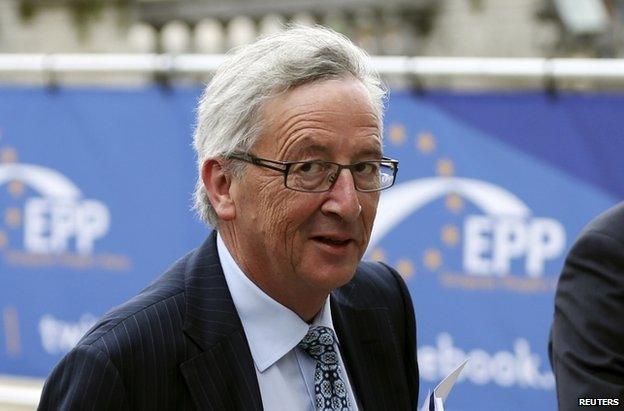European election results: Moment of truth for Juncker
- Published
- comments

Jean-Claude Juncker in Brussels
As national EU leaders gather in Brussels to digest the results of the European elections - which gave several of them a bloody nose - the powers-that-be in the European Parliament have something else on their minds.
Parliamentary leaders are waiting to see whether their cunning plan to nominate the next president of the European Commission will actually bear fruit.
The centre-left Socialist group has, somewhat reluctantly, backed the bragging rights of the candidate from the centre-right European People's Party (EPP), Jean-Claude Juncker.
"The EPP - despite substantial losses - remains the largest group in the European Parliament," said Johannes Swoboda, the head of the Socialist group in the outgoing parliament.
"Its candidate for commission president therefore has the clear right to start negotiations to seek a majority in the European Parliament."
When I asked Mr Juncker last week if he could direct me to the clause in the Lisbon treaty that gives him the "clear right" to be nominated, he looked at me with barely concealed distaste.
"You see it from your perspective," he said, "and I see it from mine. It's about democracy."
Let's (briefly) be clear. The Lisbon Treaty says EU leaders must take the results of the European elections into account when they decide whom to nominate.
The parliament gets to vote on the nomination, but it has also interpreted the treaty language to mean whichever parliamentary group wins the elections should automatically win the nomination as well.
Fireworks?
"Stretching it beyond credibility'" was the response of one sceptical official here, and we could now be on the verge of a big bust-up between the parliament and the European Council.
It's an institutional fight unlikely to impress voters who have just expressed a desire for Brussels to change the way it does business.
But parliamentary enthusiasts say that is precisely the point. They want no more deals behind closed doors.
Mr Juncker certainly has the support of quite a few national leaders, but efforts are also under way to derail his candidacy.
David Cameron isn't keen on a veteran federalist, and he can certainly count on a few allies. Hungary has declared its hand, and there may be others waiting in the wings.
Much will, as ever, depend on the attitude of the German Chancellor, Angela Merkel, who is doing what she often does - keeping her cards pretty close to her chest.
When Mr Juncker himself was asked yesterday what he thought about efforts to defeat his candidacy, he sounded a little world-weary.
"I don't care," he said. "I've already answered that question a thousand times… I'm not on my knees. We won the elections."
Stand by for fireworks.